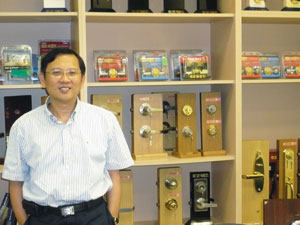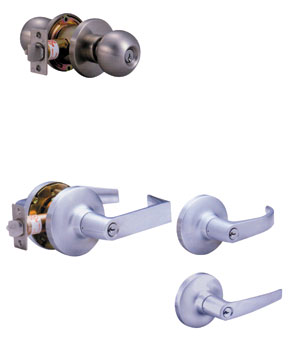Downturn is Blessing in Disguise for Tong Lung Metal Industry in Taiwan
2009/07/30 | By Ken Liu | TONG LUNG METAL INDUSTRY CO., LTD.
The oldest adage in business may be "one man's downturn is another man's opportunity," which may be another way to say that the current recession has turned out to be a blessing in disguise for Tong Lung Metal Industry Co., Ltd., Taiwan's leading lock maker and reportedly Asia's top supplier of high-grade locks, who has finally pried open ajar the typically closed door to the lock supply business globally. Simply put, the harsher climate has forced name-brand lock suppliers to cut cost by outsourcing production to overseas makers.
Tong Lung, a subsidiary of Test Rite International Co., Ltd., Taiwan's biggest trading company who also runs B&Q home improvement stores, has recently landed a hefty contract from lock maker Assa Abloy of the USA, and a sizable contract from bathroom hardware supplier Kludi of Germany.
5 Years in the Making
Assa Abloy is the biggest global supplier of branded locks, controlling 12% of the US$40 billion market worldwide. According to Tong Lung president Denny Yang, his company spent five years courting Assa Abloy for orders. "The recession is compelling big-name suppliers to cut cost by outsourcing to contract suppliers. But only quality suppliers stand a chance to land such contracts," Yang stresses.
Yang notes that the global lock market is exclusive and each market is supplied by a handful of local makers who dominate with proprietary specifications. "Big-name suppliers are now willing to farm out production to dedicated manufacturers overseas, mostly pressured by need to lower prices," explains Yang.
Kwikset of the Black & Decker Group decided long before Assa Abloy to use Tong Lung as a lock supplier.
The cost pressure has also broken a Japanese lock maker's habit of ordering only from local contractors: "This Japanese client had insisted on working with only Japanese suppliers. It took us two years of negotiation to bring him onboard," he notes.
Grades 1 and 2 Locks
These groundbreaking orders call for Tong Lung to supply grade 1 and 2 locks. According to Yang, the U.S. grade 1 standard requires locks to be able to withstand 800,000 operations, making them suitable for hospitals and schools; while the grade 2 standard tests locks to 400,000 operations, specified mainly for various public and private buildings.
Yang credits his company's success in winning these contracts mostly with having manufacturing expertise. Founded in 1954, the lock maker has 80 R&D engineers each with an average 15 years of experience in the field, holds 150 global patents, and is equipped with automated production for cost-competitiveness.
According to Yang, Tong Lung adopts computerized pressing machines built by AIDA of Japan, and automated machines from Italy and Switzerland, all of which secure quality, reliable output. The company's patent department helps buyers avoid patent infringement by advising them with information on existing patents. "And our factory in the Philippines enables us to achieve fairly competitive production," he stresses.

Duty-free Advantage
Located in the Subic Bay Freeport zone, the Filipino factory is equipped with electroplating production lines and die-casting lines. Since the U.S. government allows duty-free import of goods from the Philippines, Tung Lung, which ships 70% of output stateside, has a particular cost advantage.
The Filipino factory, which started production shortly before Test Rite took over Tong Lung in 2006, specifically fills orders for low-end, grade-3 locks used in households, hence allowing Tong Lung's main factory in Taiwan to focus on high-end locks. "Now the Taiwan head office can spend time to develop grade-1 and 2 products, where before we were preoccupied with delivering grade-3 contracts," Yang notes.
Tong Lung's sales of locks in the U.S. home building market have declined along with the slump of new home constructions since the 2007 outbreak of the sub-prime mortgage crisis, says Yang. But sales of locks as replacements, in the meantime, have risen sharply. "When people stop buying new homes, they usually spend more on home improvement. So, the DIY market tends to grow," analyzes Yang.
Rising demand for replacement locks is making the Filipino factory busier. Although the output of household locks has increased to half of its total from around 30% before the economic recession, heavier-duty locks for larger buildings generate 70% of corporate revenue, up from 30% before 2006.
Upscale Segments Locked Up
In contrast to setting up brand names, including "EZSET," "POSSE" and "LUCKY," for its grade-3 locks that are sold at hypermarts like K-Mart in the U.S. and retail stores in Taiwan, Tung Lung is still an OEM in filling orders destined for upscale markets. "High-end markets are still dominated by local big-name suppliers, who will only allow foreign suppliers a slice of the pie as contract suppliers," Yang says.
Spending 3% of annual revenue on R&D, Tong Lung introduces at least 20 new designs every year. The company has developed electronic locks by working with a local electronic manufacturer for the island's five-star hotels, says Yang, which is also a breakthrough since Taiwan's upscale hotels have always depended on foreign suppliers for electronic locks.
Lock-cum-Home Security
Trying to penetrate high-end markets, the company has been more focused on developing locks doubling as home-security systems, which can wirelessly alert owners and police upon detecting burglary, break-ins etc. "Also, lock systems that can open or close windows to ventilate a room upon smoke detection by a fire alarm are on the drawing board," Yang notes.
Tung Lung's strategy to diversify, which helps to fill idle capacity during the recession, has paid off: the Kludi order from Germany allows the company to branch into bathroom hardware. Yang believes Kludi's orders can achieve a ripple effect, attracting other big-name bathroom hardware suppliers to follow suit.
30% Decline in 2008 Revenue
Admitting being impacted by the economic recession and recently surging commodity prices, Yang says that the company's 2008 revenue dropped 30% from a year earlier, to NT$2.7 billion (US$84 million at US$1:NT$33), and earnings-per-share to NT$3.6 from 2007's NT$5.56, projecting the company's revenue decline to moderate and earnings to improve this year due chiefly to successful cost control and dropping commodity prices.
Yang is buoyed by the promising orders from Assa Abloy and Kludi amid the downturn. "Cost sensitivity has become the central issue for suppliers during the recession. So, we expect more orders from big-name suppliers, who are likely to take a cue from the American and German buyers. We are particularly optimistic about the future of the lock business as the world's top-three suppliers command only 30% of the global market, leaving 70% as potential source of business," he observes.




